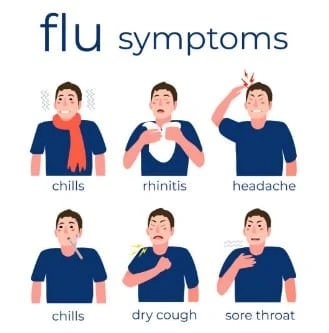Introduction:
The flu, short for influenza, is a viral infection that strikes millions of people each year, causing a range of symptoms that can include intermittent fevers. In this post, we will explore what the flu is, its symptoms, and why intermittent fevers occur. We’ll also discuss essential tips for managing flu related fevers and when to seek medical attention.
Understanding the Flu:
The flu is a contagious respiratory illness caused by influenza viruses. It can affect anyone, regardless of age or health status, and typically spreads through respiratory droplets when an infected person coughs, sneezes, or talks. Flu season can vary in intensity and timing each year, but it commonly occurs in the fall and winter months.
Common Symptoms:
Flu symptoms can range from mild to severe and typically include:
- Fever: One of the hallmark symptoms of the flu is a sudden and often high fever. This fever can come and go, leading to intermittent fevers.
- Chills: Accompanying the fever, you may experience chills and body aches.
- Cough: A persistent cough is common, often accompanied by a sore throat.
- Runny or Stuffy Nose: Similar to the symptoms of the common cold, you may experience nasal congestion and a runny nose.
- Fatigue: The flu can cause extreme tiredness and weakness, sometimes lasting for several weeks.
- Headache: Headaches are another common flu symptom.
- Muscle and Joint Pain: Your muscle and joints may ache, making it uncomfortable to move.
- Gastrointestinal Symptoms: Some people with the flu experience nausea, vomiting, or diarrhoea, although these symptoms are common in children.
Why Intermittent Fevers Occur?
Intermittent fevers during a flu infection are a result of the body’s immune response to the virus. The fever is a sign that your immune system is actively fighting off the infection. Fevers can come and go as your body’s defence’s ebb and flow in their efforts to eliminate the virus. While fevers can be uncomfortable, they play a vital role in the recovery process by creating an environment less hospitable to the virus.
Managing Intermittent Fevers from the Flu:
Here are some essential tips for managing intermittent fevers caused by the flu
- Stay Hydrated: Drink plenty of fluids, such as water, herbal teas, and broths, to prevent dehydration.
- Rest: Give your body the rest it needs to recover. Avoid strenuous activities until your fever has subsided.
- Warm Baths: A lukewarm bath can help reduce fever-related discomfort. Avoid cold baths, as they can cause shivering and worsen the fever.
- Isolate Yourself: To prevent spreading the flu to others, stay home from work or school until you are fever-free for at least 24 hours without the use of fever-reducing medications.
When to Seek Medical Attention?
While most cases of the flu can be managed at home, it is essential to be aware of warning signs that indicate the need for medical attention.
- Difficulty breathing or shortness of breath
- Severe chest or abdominal pain
- Confusion of altered mental state
- High fever lasting more than a few days
- Symptoms that improve but then return with worsened intensity
In these situations, seek medical care, as they may indicate complications or severe illness.
Homeopathic Medicines for Flu and Fevers:
- Aconitum: This remedy is often used in the early stages of flu with sudden onset, high fever, restlessness, and extreme anxiety. It is especially helpful if the symptoms come on after exposure to cold, dry wind.
- Belladonna: This Homeopathic medicine is helpful when there is a high fever, red face, throbbing headache, and delirium. It is also useful for fevers with sudden onset.
- Bryonia Alba: Bryonia is beneficial when flu symptoms include a dry hacking cough, body aches that worsen with movement, and extreme thirst for cold drinks.
- Natrum Mur: Natrum Mur is wonderful medicine for the flu presents with watery nasal discharge, sneezing, and a strong desire for salty foods.
- Pulsatilla: Pulsatilla may be indicated when flu symptoms include thick, yellow or green nasal discharge, along with a desire for fresh air and comforting. To buy Homeopathic Medicines Online.
Conclusion:
Dealing with the flu and intermittent fevers can be challenging, but understanding the nature of the virus and how to manage its symptoms is crucial. Remember to practice good hygiene, such as frequent hand washing and covering your mouth when coughing or sneezing, to prevent the spread of the flu to others. Additionally, consider getting an annual flu vaccine, which can significantly reduce your risk of contracting the virus.




